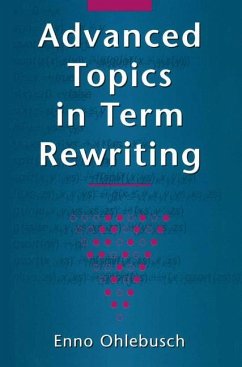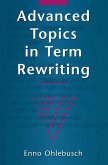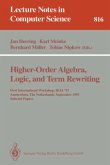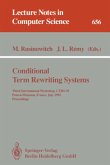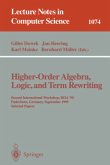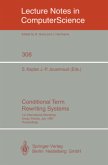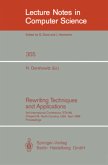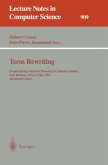Term rewriting techniques are applicable in various fields of computer sci ence: in software engineering (e.g., equationally specified abstract data types), in programming languages (e.g., functional-logic programming), in computer algebra (e.g., symbolic computations, Grabner bases), in pro gram verification (e.g., automatically proving termination of programs), in automated theorem proving (e.g., equational unification), and in algebra (e.g., Boolean algebra, group theory). In other words, term rewriting has applications in practical computer science, theoretical computer science, and mathematics. Roughly speaking, term rewriting techniques can suc cessfully be applied in areas that demand efficient methods for reasoning with equations. One of the major problems one encounters in the theory of term rewriting is the characterization of classes of rewrite systems that have a desirable property like confluence or termination. If a term rewriting system is conflu ent, then the normal form of a given term is unique. A terminating rewrite system does not permit infinite computations, that is, every computation starting from a term must end in a normal form. Therefore, in a system that is both terminating and confluent every computation leads to a result that is unique, regardless of the order in which the rewrite rules are applied. This book provides a comprehensive study of termination and confluence as well as related properties.
From the reviews:
"The book Advanced Topics in Term Rewriting (ATITR) begins with an Abstract Reduction System ARS. ... there are not many textbooks written in English on term rewriting. ... if you like mathematics, already know the basics of term rewriting and you are a researcher or a postgraduate then this book is definitely recommended." (Nimish Shah, Journal of Functional Programming, Vol. 16 (2), 2006)
"A well-written overview of recent research with many references to the literature, and hence has clearly an added value over a collection of papers. ... contains a pleasant surprise in the form of a chapter on termination of logic programs. ... it can be very well used for a seminar for advanced students who already know the basics of term rewriting. ... it is written in a clear and rigorous way. ... I very much recommend the book for researchers and advanced students ... ." (Femke van Raamsdonk, Theory and Practice of Logic Programming, Vol. 4 (4), 2004)
"The book starts with some motivating examples of Term Rewriting Systems (TRSs) (e.g. 'coffee can problem'). ... There are other books on TRSs but these are in fact introductory textbooks whereas Ohlebusch's book covers several important fields in term rewriting that go beyond the scope of an introductory book - especially fields to which the author himself made essential contributions. In this way this monograph is an outstanding one, suitable for all Computer scientists who study and use term rewriting." (A. Widiger, Zentralblatt MATH, Vol. 999 (24), 2002)
"The book Advanced Topics in Term Rewriting (ATITR) begins with an Abstract Reduction System ARS. ... there are not many textbooks written in English on term rewriting. ... if you like mathematics, already know the basics of term rewriting and you are a researcher or a postgraduate then this book is definitely recommended." (Nimish Shah, Journal of Functional Programming, Vol. 16 (2), 2006)
"A well-written overview of recent research with many references to the literature, and hence has clearly an added value over a collection of papers. ... contains a pleasant surprise in the form of a chapter on termination of logic programs. ... it can be very well used for a seminar for advanced students who already know the basics of term rewriting. ... it is written in a clear and rigorous way. ... I very much recommend the book for researchers and advanced students ... ." (Femke van Raamsdonk, Theory and Practice of Logic Programming, Vol. 4 (4), 2004)
"The book starts with some motivating examples of Term Rewriting Systems (TRSs) (e.g. 'coffee can problem'). ... There are other books on TRSs but these are in fact introductory textbooks whereas Ohlebusch's book covers several important fields in term rewriting that go beyond the scope of an introductory book - especially fields to which the author himself made essential contributions. In this way this monograph is an outstanding one, suitable for all Computer scientists who study and use term rewriting." (A. Widiger, Zentralblatt MATH, Vol. 999 (24), 2002)

